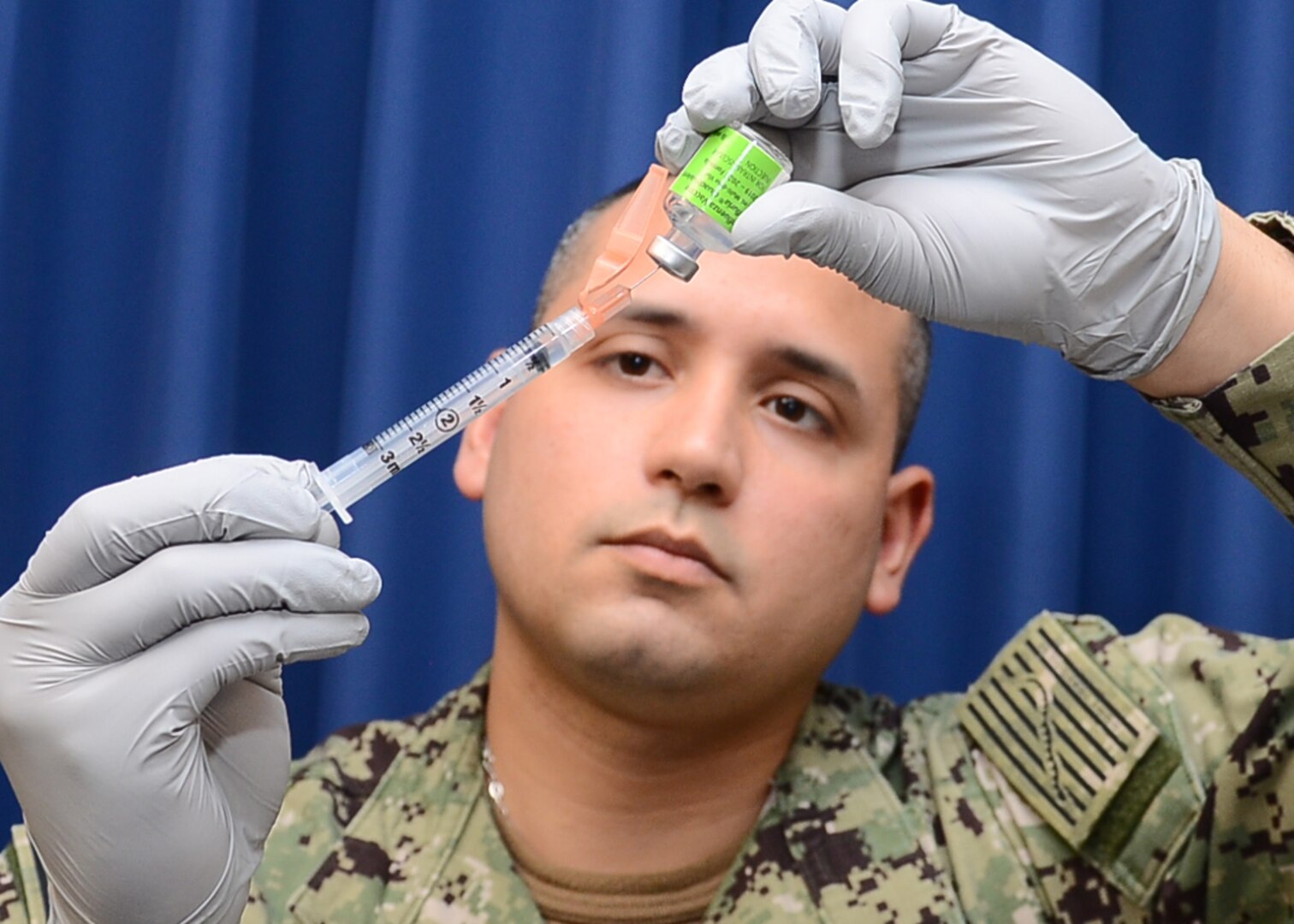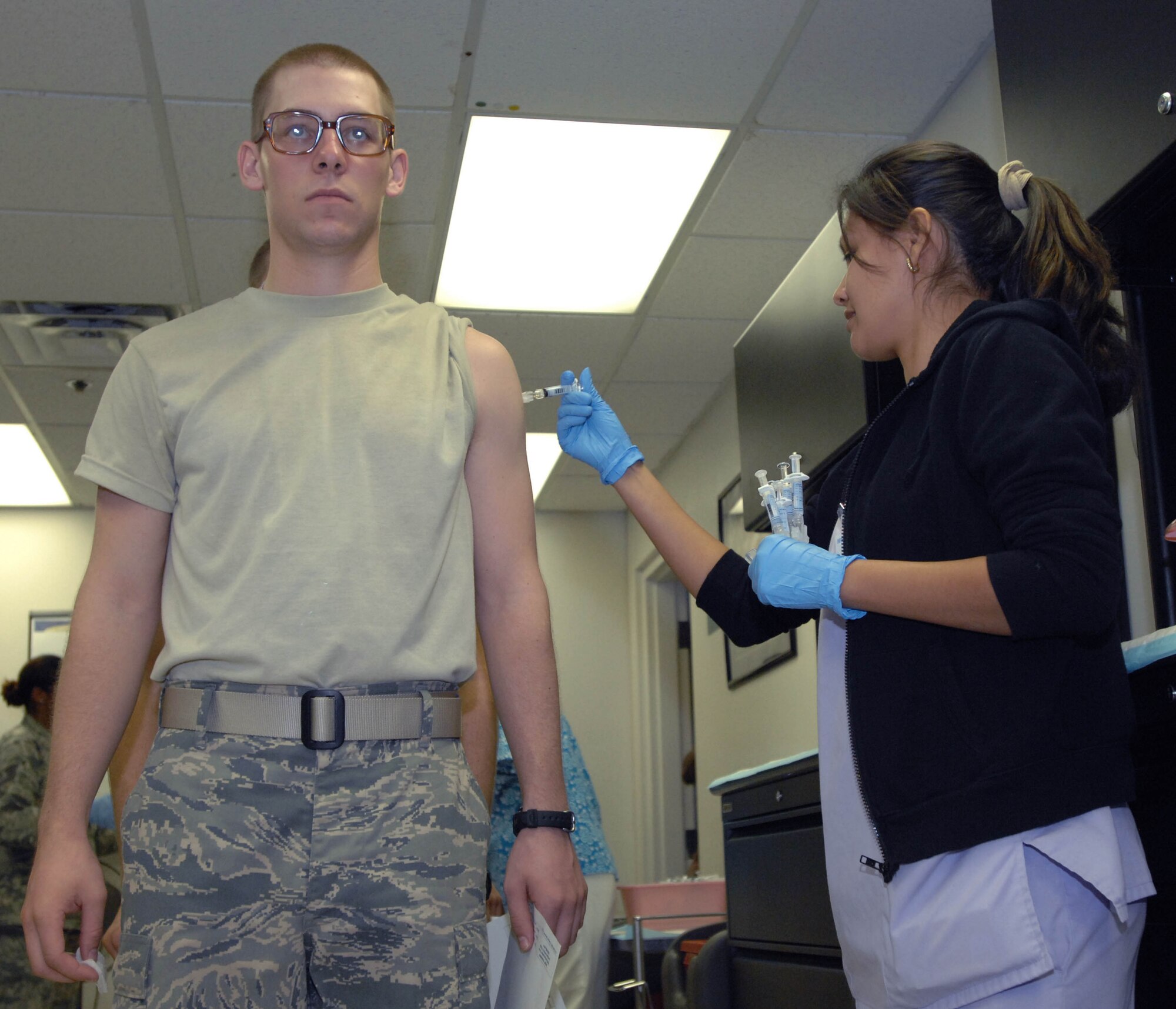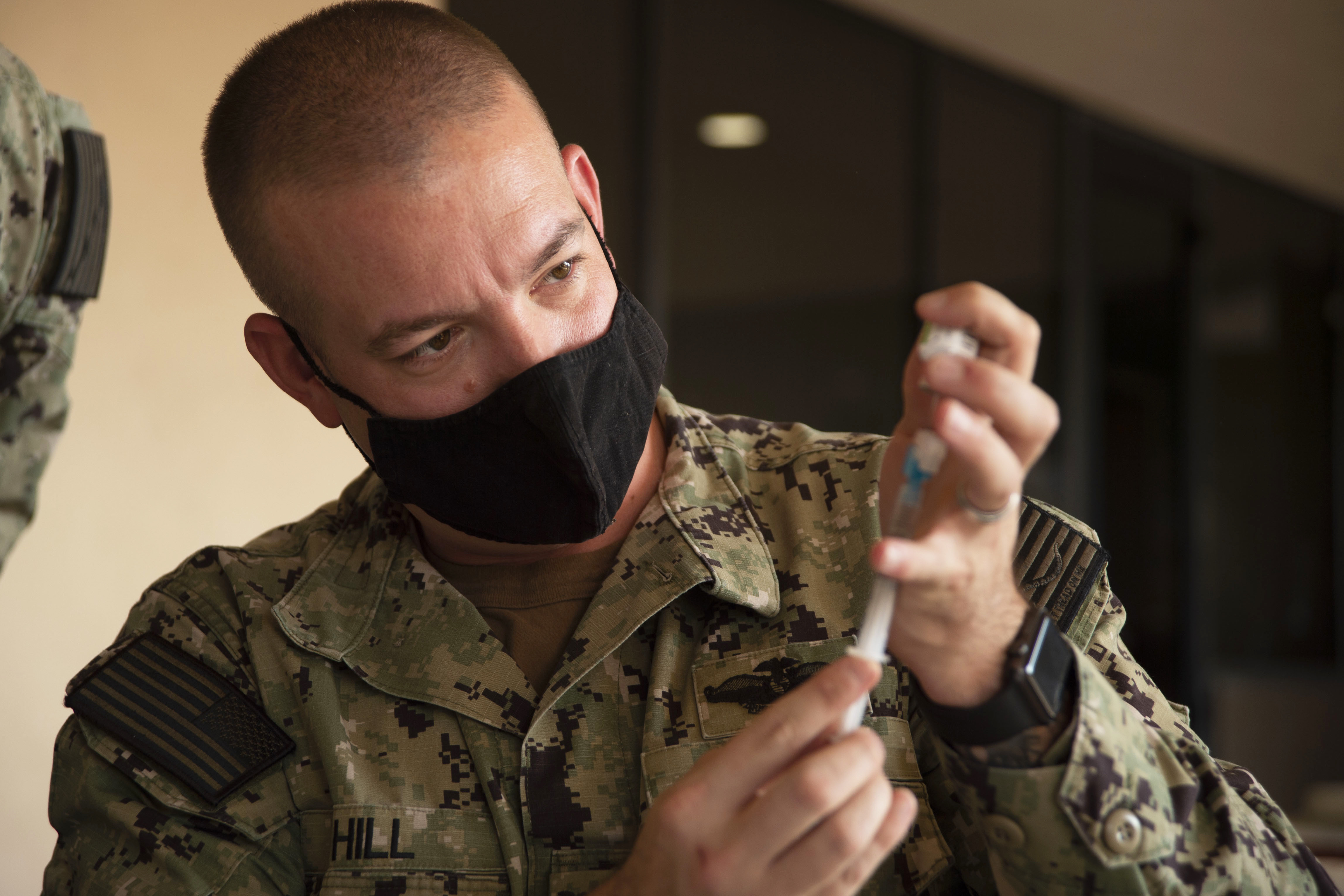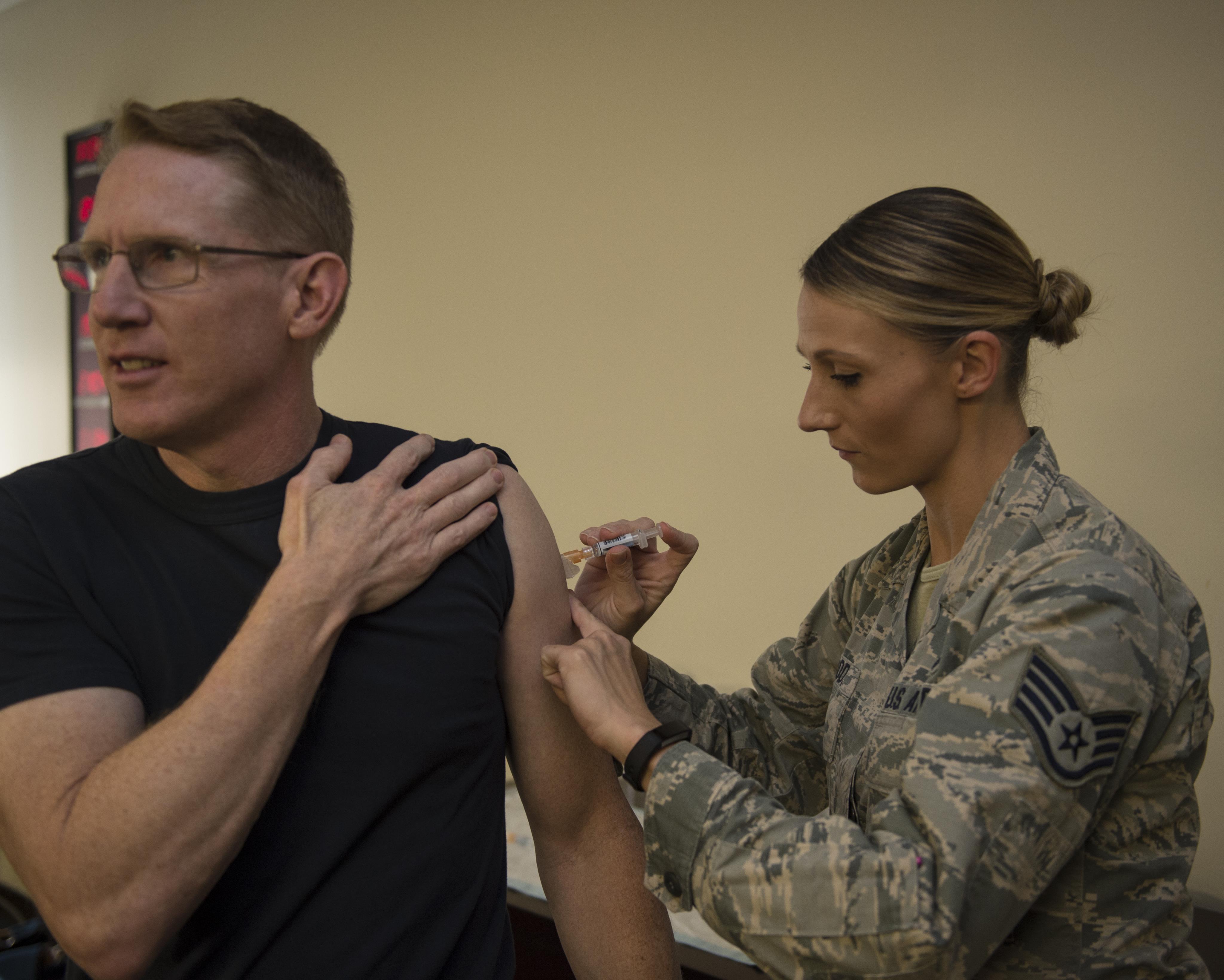Military Flu Shot - Col. Timothy Walsh, deputy chief of US Medical Logistics, receives a flu shot at a hospital October 27 at Fort Detrick, Maryland. Administering the Walsh Influenza Shot - Spc. Neil Burnett is a clinical scientist at the United States Medical Research Institute for Infectious Diseases. (Photo: CJ Lovelace) CHECK OUT
FORT DETRICK, Maryland. As the annual flu season approaches, the US Medical Device Agency is working hard to distribute more than 1.5 million doses of the vaccine to protect military personnel, their families and retirees.
Military Flu Shot
According to Liz Andrews, deputy director of USAMMA's Distribution Operations Center, or DOC, the annual flu vaccine is about half of the 3.3 million doses distributed in the Department of Defense.
Flu Shots Available For Active Duty, High Risk
DOC USAMMA administers annual distributions to active duty military and reservists and the Department of Civilian and Family Affairs. The agency works closely with other agencies in the US Department of Defense to ensure timely availability and availability.
"This season is going well," Andrews said. "We are ahead of schedule compared to the last four years. Early collection of requirements and an early request from the Defense Logistics Agency have allowed this season to run smoothly. "
USAMMA reports directly to the Medical Logistics Command. Both units are located at Fort Detrick, Maryland.
Although flu viruses can circulate year-round, numbers begin to peak in October and then peak between December and February in the US, according to the Centers for Disease Control and Prevention. However, the main flu activity can continue until May.
Thousands Of U.s. Military Defy Covid 19 Vaccine Order
Doctors recommend getting a flu shot every year, especially during the ongoing COVID-19 pandemic. According to the World Health Organization, the best way to protect yourself from the flu and COVID-19 is to get vaccinated against both viruses.
The 2020 flu season was not particularly important for a number of reasons, including more people wearing masks in public more often, exercising longer distances, washing their hands more often, or staying at home to protect themselves from COVID-19.
"The season is expected to be very high this year due to the large number of travelers," said Lt. Col. Todd Reeder, drug counselor and DOC director. "People should continue to wear masks because it helps prevent the spread of droplets when they sneeze or cough."

In addition to washing your hands and social distancing whenever possible, Reeder said the annual flu shot remains the best way to protect yourself from the flu virus.
Department Of Defense Mandates Covid 19 Vaccinations For Service Members > Tricare Newsroom > Articles
The first dose of this season's flu vaccine began shipping in late August to key locations outside the United States, Andrews said.
Some of the exports are sent to the US Department of Defense Medical Devices Agency, also known as TLAMM, which distributes them to beneficiaries around the world.
Two other direct AMLC divisions, the US Medical Materials Center Europe in Germany and the US Medical Materials Center Korea in South Korea, serve as major distribution centers for their theaters.
Supporting beneficiaries in the US European Command and the US Africa Command, USAMMC-E is the entry point for approximately 122,000 units this season.
Flu Vaccine Essential During Covid 19 Pandemic > Joint Base San Antonio > News
"We receive EUCOM and ARICOM shots and distribute them according to customer needs," said Maj. Todd Schwartz, Director of Pharmacy and USAMMC-E Laboratory. "We also receive, refurbish, and ship to Navy and [US Medical Technology Center Southwest Asia] customers."
In total, USAMMC-K distributes 62,000 units on the Korean Peninsula. As of September 7, USAMMC-K has received its first shipment of 19,250 units through DOC, with additional deliveries expected in November.
"We have started distributing vaccines throughout the island, providing vaccines to Air Force hospitals and the US Embassy," said Capt. Daniel Miller, USAMMC-K Assets Management and Accountability Officer.

Miller emphasized the importance of soldiers, families, and other beneficiaries receiving annual shots as a way to protect the future.
Flu Shot Is Essential Preventive Step To Avoid Illness > Air Force > Article Display
"The ongoing COVID-19 pandemic, and the recent increase in cases, makes the flu vaccine even more important," he said.
Although last year was relatively mild when it comes to the flu, Miller encouraged everyone to be extra vigilant this season.
"Last year, the United States had the lowest number of flu cases," he said. "With kids in school and a lot of people trying to get back to normal, there's a good chance we'll see more cases of the flu this year." Clayton Keller (left) administers the annual flu shot to Colonel Michael B. Lalor, Director of Medical Logistics, on October 8 at Fort Detrick, Maryland. The company provides 1.5 million flu shots worldwide to help soldiers and their families. .. (Photo: USA) SEE FIRST
FORT DETRICK, Maryland. At the start of flu season, the US Medical Devices Agency's Operations Distribution Center (DOC) distributes more than 1.5 million doses of flu vaccine to help soldiers and their families stay healthy.
Naval Health Clinic Annapolis > Health Services > Preventive Care > Immunizations > Flu Vaccine Information
DOC officials said that the first shipment of vaccines, sent on September 6, was sent to active duty, reservists, retirees and their families, as well as to National Guard units across the country.
"Wherever the soldier is, we will give him a cold shot," said Lt. Col. Todd A. Reeder, DOC executive director.
As of October 1, 467,000 doses of the vaccine have been sent, or about 30% of the requested batch.
The US accounts for the 3.3 million doses distributed in the Department of Defense, which has set an annual goal of vaccinating at least 90% of all active duty troops by January 15, 2020.
U.s. Army Southern European Task Force, Africa
Although the flu virus circulates throughout the year, cases begin in October and peak between December and February, although seasonal cases can continue into May, according to the Centers for Disease Control and Prevention (CDC).
This was the case with the last flu season, which lasted 21 weeks. It was the longest flu season in the US in a decade.
The CDC estimates that, on average, 5% to 20% of the US population gets the flu each season, with children and the elderly most at risk.
Now, 10 years after the 2009 H1N1 flu pandemic, influenza remains a real threat to war preparedness. Reeder said it's not something to be taken lightly.
U.s. Army Health Center Vicenza Highlights The Importance Of Flu Vaccination
"You can stop the whole system, and make it ineffective if the flu virus gets into the system," he said. "That's why they emphasize that every soldier gets a flu shot every year so that the team and the soldier are prepared."
To prepare, the DOC at USAMMA - a unit that reports to the new Medical Logistics Command located at Fort Detrick in Frederick, Maryland - is working with the Department of Defense Health Agency and the Department of Defense Logistics Agency, which oversees annual purchases and supplies. Department of Defense.
Andrews said that even before the flu season ends, the next season's notices and dose requests are sent around the world in January.
From there, the number of doses requested is given to the DHA, which manages the cooperation with the DLA, he said.
The Flu Shot
Reeder said the CDC works directly with flu vaccine manufacturers to predict the upcoming flu season so they can develop a different vaccine each year.
Doses are available in different formulations to treat different populations, from infants six months of age or older to those over 65 years of age.
The CDC recommends getting the flu shot every year in late October. Children 6 months to 8 years old may need two doses one month apart.
According to the CDC, “Vaccination testing should continue throughout the flu season because the length of the flu season varies and flu cases may not appear in some areas until February or March.
How The U.s. Military Might Help Answer A Critical Question About The Flu Vaccine
"Although vaccination is recommended at the end of October, vaccination given in December or later, even when flu activity has already begun, may be beneficial in most flu seasons." John "Ryan" Bailey, head of the US Medical Devices Agency, received a flu shot at the Oct. 29 vaccination clinic at Fort Detrick, Maryland. The USAMMA Operations Distribution Center, or DOC, oversees the annual distribution of influenza vaccines to active duty and reserve military personnel, families, civilian personnel, and retirees. (Photo: CJ Lovelace) CHECK OUT
FORT DETRICK, Maryland - Ahead of the annual flu season, the US Medical Device Agency is working to distribute nearly 1.6 million doses of the flu vaccine to protect military personnel, their families, and retirees.
The USAMMA Operational Distribution Center, or DOC, oversees the distribution of annual vaccines to active duty and reserve military personnel, as well as civilians and family members. This is based on the number of levels mandated by the Department of Defense.
As of October 28, nearly half of the doses have been shipped to the US and abroad. DOC officials plan to complete the distribution by the end of November.
Bamc Offers Covid 19, Flu Vaccines At Jbsa Fort Sam Houston Vaccine Site > Joint Base San Antonio > News
Institutions




Post A Comment:
0 comments so far,add yours